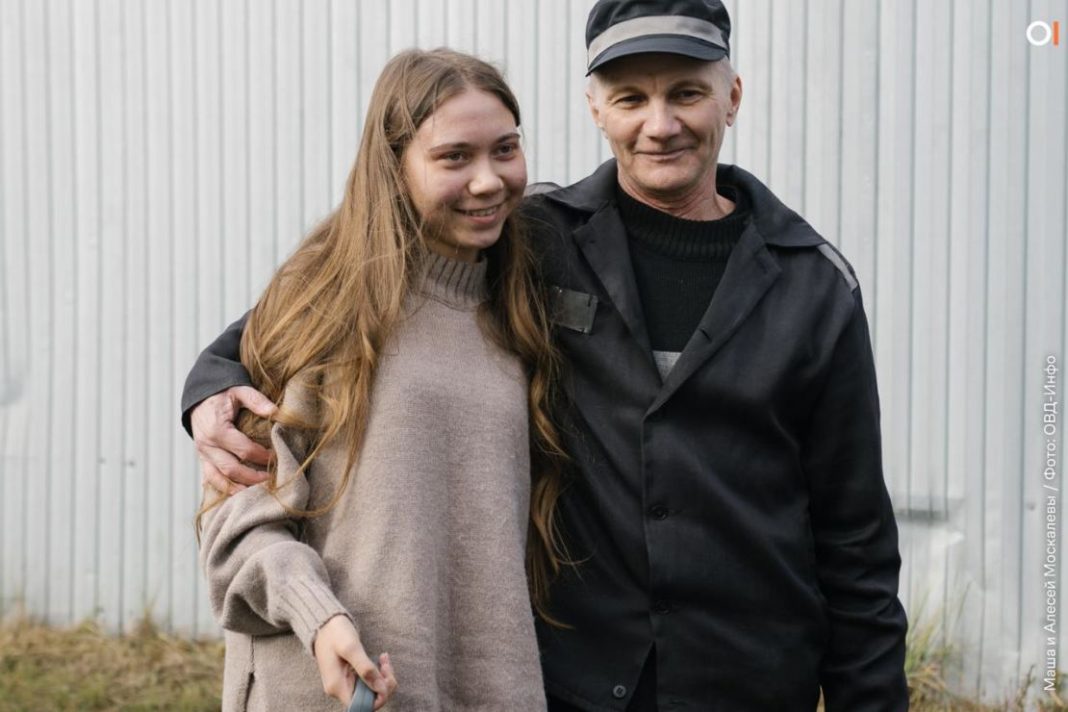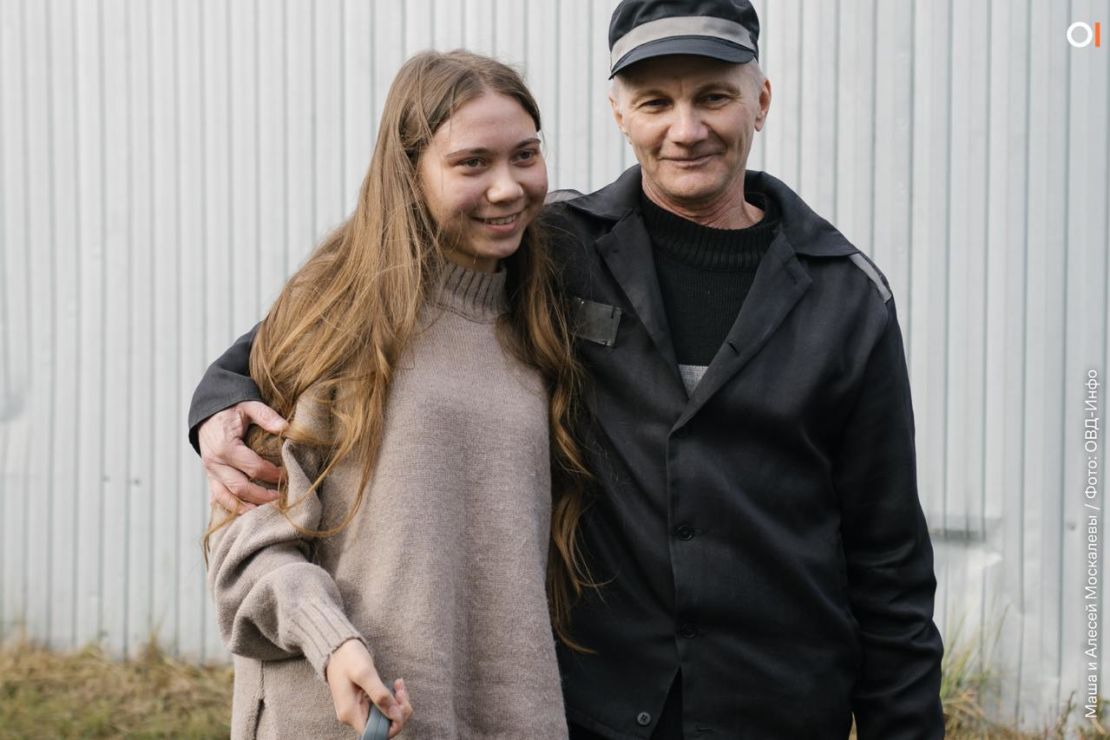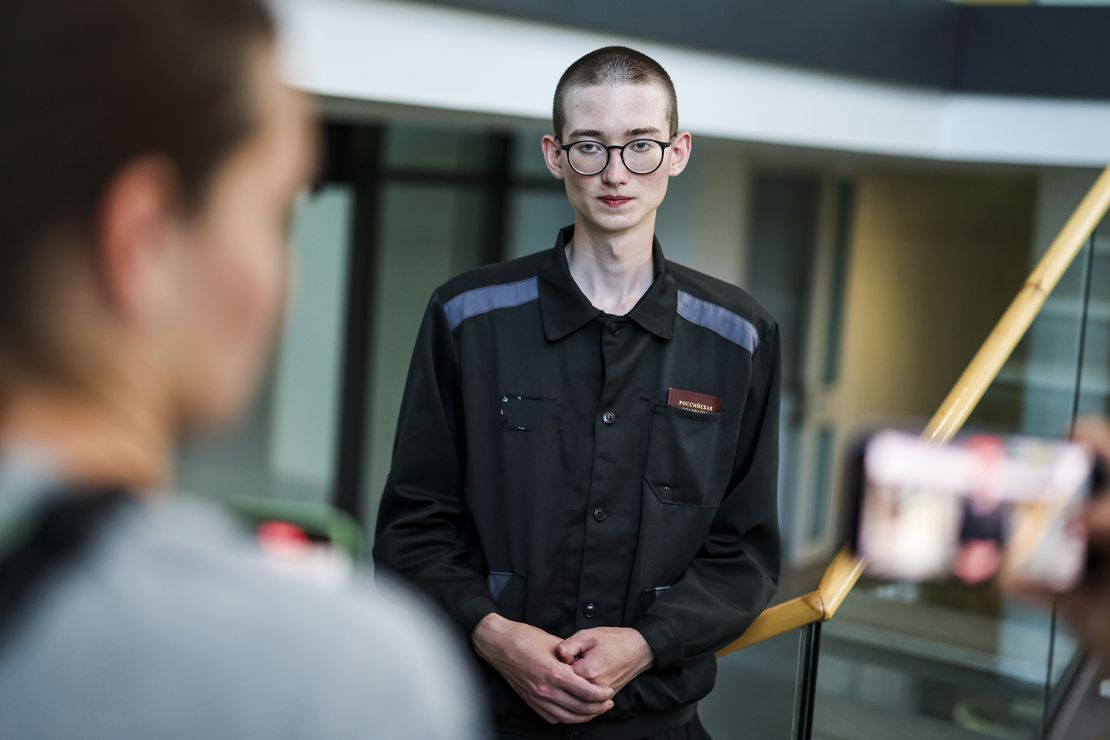On a cold November morning, Irina Turbina packs bags filled with food, adds two large shower gels, two bulky packs of toilet paper, nail clippers, a novel, and a geography atlas, and sets out on a grueling two-day trip. The bags and books are for her son, 16-year-old Arseny. It might be her last chance to catch a glimpse of him before he is sent to a juvenile correctional colony to serve a five-year sentence.
Arseny Turbin is recognized by several human rights groups as one of Russia’s youngest political prisoners. He was sentenced in June after being found guilty of terror offenses for allegedly joining the Freedom of Russia Legion, a paramilitary unit of Russian volunteers fighting for Ukraine. He admits he contacted the group but denies he joined, and his mother maintains he is innocent.
He is among at least 35 minors who have faced politically motivated criminal charges in Russia since 2009, according to the independent monitoring organization OVD-Info. Of those, 23 cases have been initiated since Russia started its full-scale invasion of Ukraine in 2022.
Turbina, who lives in the small town of Livny in the Oryol region, some 300 miles to the south of Moscow, has made the long journey to a pre-trial detention center on the outskirts of the capital every two weeks, as visits are restricted to twice a month. After hours of waiting, she sees her son through a barred glass partition, speaking only by telephone. Holding hands or touching is strictly prohibited.
Arseny Turbin, 16, was sentenced in June to serve five years in prison for terror offenses. He denies the charges. CNN has blurred the face of the other person pictured to protect her privacy. Irina Turbina
“The last time I hugged him was June 20, the day the verdict was pronounced,” she recounted in a phone interview with CNN. “He hugged me, cried, and then the guards immediately came up and took him away.”
In August, a year after he was first questioned, Arseny marked his 16th birthday behind bars.
“Please, I’m asking you to do everything you can to make sure I get released,” Arseny begged his mom in a letter written ahead of an appeal hearing last month and shared with CNN. He had lost 15 kilograms (33 pounds) due to a stress-induced lack of appetite and had been moved to a different cell after episodes of violence from fellow inmates, he said, describing the situation to his mother as “very difficult, critical.”
When Irina got this letter, she couldn’t hold back her tears. “I cried because I understand that I am already doing the best I can,” she told CNN. “But I know it’s not enough, and that I can’t change the system.”
Excerpt from a letter written by Arseny Turbin to his mother and shared with CNN. Photo Illustration by Leah Abucayan/CNN
His appeal to overturn his five-year sentence was denied. The next day, Irina came again for a visit, prepared to demonstrate her strength and resilience to help Arseny cope with the devastating ruling.
“I said, ‘Arseny, I’m so proud of you,’” she recalled. “‘You are actually stronger than the people who convicted you,’” she told him, “‘because you have the right to express your opinion and position, while these people only do what they have to do.’”
Her only child faces being moved to a correctional facility for teenagers but for the moment remains in Detention Center No. 5.
Videos provided by Irina Turbina show Arseny enjoying moments of everyday life, from swimming to a snowy walk with his mother, before his imprisonment. Irina Turbina
‘I’m terrified for him’
Turbina still struggles to comprehend how this happened. “He is just a kid, he has been different since early childhood,” she said. She describes Arseny as someone with “a love for books and studying,” who showed an interest in politics as early as 14, liked to “delve into everything,” and was not afraid to speak his mind and tell the wrong from the right at school or online.
In April 2023, Arseny called a morning live show on TV Rain, an independent network based outside of Russia, to vent about his disappointment in President Vladimir Putin and call out state propaganda at his school. “Human rights are being violated,” he said.
Then on June 12, Russia Day, Irina says he staged a solo protest in their hometown and printed out leaflets that read “I am against Putin” and “freedom for political prisoners,” among other anti-government slogans. She tried her best to discourage him, fearing what might happen.
Video Ad Feedback
Arseny Turbin, then 15, stages a solo protest in June last year in his hometown of Livny.
00:24 – Source: CNN
“He said ‘Mom, don’t worry, I’m not violating the law,’” Irina recounted. She told him the authorities would go after them, but he didn’t believe her.
Early on August 29, 2023, officers from the Russian Federal Security Service (FSB) knocked on their door. They searched the apartment and took away personal items including a tablet, a laptop, and cell phones.
Arseny was placed under house arrest in September with the right to attend school. In the fall of 2023, Russia’s financial monitoring agency designated Turbin as a “terrorist and extremist” on its official list. Then this summer, on June 20, came the sentencing.
Turbina is deeply fearful of the toll the penitentiary system may take on her son. “I’m terrified for him,” she confided to CNN. “I’m worried how he will spend these years and whether part of him will break. I want to believe that he will be strong until the end and will pass the test with dignity. But he is still just a child after all, and what if, at some point, some circumstances might break him?”
An excerpt from another letter sent by Arseny Turbin to his mother, and shared with CNN, describes tough conditions in detention. Illustration by Leah Abucayan/CNN
Arseny’s is not an isolated case. Russian law permits the prosecution of children as young as 14 for serious crimes, including terrorism and treason — broad charges increasingly pursued against young people since Russia’s invasion of Ukraine, said Sergei Davidis, who heads the Political Prisoners Support Program at Memorial Human Rights Center.
This reflects a broader escalation in Moscow’s crackdown on dissent, which began before the war but has intensified since February 2022. Since then, at least 20,070 people have been detained for anti-war views, and 9,369 cases of “discrediting the army” have been recorded, relating to actions including social media posts or wearing clothes with Ukrainian flag symbols, said Dmitry Anisimov, spokesperson for OVD-Info.
Parents and caregivers have also been targeted through harassment, arbitrary arrests, and even threats of losing custody of their children, according to independent monitoring organizations such as OVD-Info and Memorial.
The Kremlin consistently denies the existence of political prisoners in Russia, claiming all incarcerations are based on legal violations, despite human rights organizations indicating otherwise.
‘Not just statistics’
Kevin Lick, a 19-year-old dual Russian-German citizen, knows the price of dissent in modern Russia all too well. Arrested at 17, a year after the war in Ukraine began, he was sentenced to serve four years in a penal colony, becoming the youngest person in modern Russian history ever to be convicted of state treason.
Prosecutors accused him of photographing military objects with the intent to share them with foreign intelligence – claims Lick denies.
During his imprisonment, the teenager says he was put in solitary confinement, endured physical abuse and brutal prison conditions. “Looking back, of course, it left scars,” he said, acknowledging his ongoing struggle with PTSD.
Russian authorities have not publicly addressed the claims, nor has Russia’s Federal Penitentiary Service responded to CNN’s request for comment regarding allegations that teenagers in detention have suffered violence and mistreatment.
Kevin Lick, who was released in a prisoner exchange, stands on the sidelines of a press conference organized by the Foundation Against Corruption in Bonn, Germany, on August 2, 2024. Christoph Reichwein/dpa/AP
Lick was released in August as part of a major prisoner swap between Russia, the United States and other Western nations. Although it was the largest prisoner swap since the Cold War, the detainees freed account for less than 2% of the total number of political prisoners held in prisons in Russia.
Russia’s latest effort to sway young minds: High-school textbooks praising the conflict in Ukraine
According to OVD-Info, at least 2,942 people are facing criminal prosecution for political reasons in Russia, with 1,402 currently in detention, including those awaiting trial or undergoing court-ordered compulsory treatment.
Reunited with his family in Germany, Lick now advocates for political prisoners, marching alongside Yulia Navalnaya, the widow of Alexey Navalny, and other exiled opposition leaders, at a protest last month in Berlin.
Lick maintains there are many more people, including teenagers, who are facing repression in Russia for their anti-war stance.
“They’re not just statistics,” he said. “They are part of Russia and part of the future of Russia. And we must ensure that this feature is not stolen by the government.”
Addressing young Russians, he urges them to resist conscription. “If they are going to enlist you in the military, just don’t go. In my opinion, it is better to go to prison than being a killing machine in Ukraine.”
Arseny Turbin is pictured via videolink ahead of his appeal hearing on November 7. His mother, Irina Turbina, attended the court session on the outskirts of Moscow. Irina Turbina
While conditions in detention are supposed to be slightly more lenient for teenagers than for adults, juvenile penal colonies can in fact be even harsher due to the chaotic and violent environment among young inmates, said Davidis, of Memorial.
Davidis believes young people are pursued for prosecution by the state because they are seen as less intimidated by government authority, less influenced by propaganda, and more likely to act against perceived unfairness.
While independent Russian media have covered Turbin’s case in detail, state media outlets have not – perhaps because much of the proceedings has been held behind closed doors.
“Unfortunately, usually we do not have access to the cases, to the details of their cases,” Davidis said, with the state citing privacy concerns because they involve minors.
Other experts, among them Nina Khrushcheva, professor of international affairs at the New School and great-granddaughter of former Soviet leader Nikita Khrushchev, point to the country’s long history of using fear and indoctrination to maintain control.
The Russian state seeks to shape citizens’ views starting in early childhood, Khrushcheva said. “Because they think from a young age, if you brainwashed them the right way, then at the age of 16, they say ‘wonderful, Putin is great.’”
This picture, drawn by Alexey Moskalyov’s then-12-year-old daughter, attracted the attention of school authorities. He was fined and then imprisoned for his own online posts critical of the invasion of Ukraine. Memorial in English
Jailed after child’s anti-war drawing
When children are too young to face prosecution under Russian law, it’s not unknown for a parent to bear the brunt. Such was the case for entrepreneur and single father Alexey Moskalyov, who was sentenced to nearly two years in prison for “discrediting the Russian army” on social media.
The charges against him came shortly after his then-12-year-old daughter, Masha, drew an anti-war picture in April 2022, two months into Russia’s invasion of Ukraine. The drawing featured a Russian flag with the words “No to war,” a Ukrainian flag with the inscription “Glory to Ukraine,” and a woman shielding her child from missiles fired from Russia. The picture drew the attention of school authorities; Moskalyov was initially fined and then incarcerated for his own online posts critical of the war, while Masha was temporarily put in an orphanage.
Released in October, Moskalyov emerged from prison gaunt and wearing a thin, faded prison uniform. Video footage showed him embracing his tearful daughter.
Alexey Moskalyov hugs his daughter Masha after he was released from prison on October 15. He was sentenced to nearly two years for “discrediting the Russian army” on social media. OVD-Info
“The conditions were… there are no words to describe it. It was simply a torture chamber,” he said, recounting the brutal experience. Held in a tiny cell, sometimes shared with another prisoner or rats from the sewers, he had to spend 16 hours a day on his feet in frigid temperatures.
The harsh conditions in Russian prisons have taken a toll on prisoners of conscience, with some losing their lives, like the late opposition leader Alexey Navalny.
Reflecting on the fate of the opposition leader her 16-year-old son so looked up to, Turbina struggles to imagine what kind of bleak future Arseny might be facing.
“God forbid… repeating Alexey Navalny’s fate. It’s just beyond… (words). In this case… it will probably be impossible to survive,” she said, her voice trembling before she paused to regain her composure.
She hopes, as a child, her son will receive some protection. And, for now, she has a message for Arseny: “We need to accept what is happening, not give up hope and keep fighting.”
Cre: CNN








